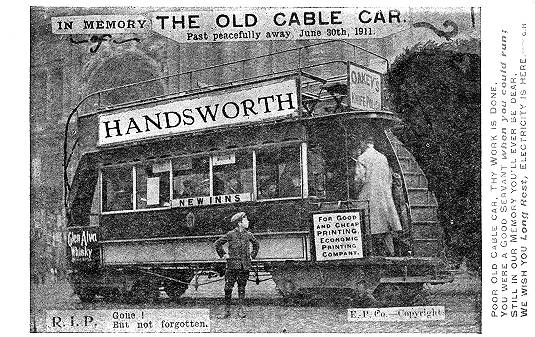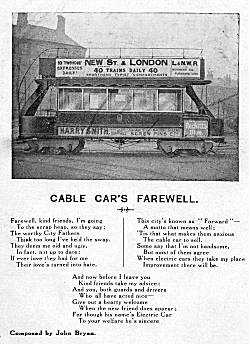

Produced at the date of the withdrawal of cable trams in 1911, this card was published by the Economic Printing Company. The image of the tram has been greatly modified with the addition of the title "Handsworth" and the advertisement for their own printing. The card carries the poem by a "G.H.":
Poor old cable car, thy work is done,
You were a good servant when you could run;
Still in our memory you'll ever be dear,
We wish you long rest, Electricity is here.
The second card right from an unknown publisher shows a smaller view of a cable car but with a more elaborate rhyme from a John Bryan:
 Farewell my friends, I'm going
Farewell my friends, I'm going
To the scrap heap so they say;
The worthy City Fathers
Think too long I've held the sway.
They deem me old and ugly,
In fact, not up to date;
If ever love they had for me
Their love's turned into hate.
This city's known as "Forward" -
A motto that means well;
'Tis that what makes them anxious
The cable car to sell.
Some say that I'm not handsome,
But most of them agree
When electric cars they take my place
Improvement there will be.
And now before I leave you
Kind friends take my advice;
And you both guards and drivers
Who all have acted nice -
Give out a hearty welcome
When the new friend does appear;
For though his name's Electric Car
To your welfare he's sincere.
From January 1886 the City of Birmingham Tramways Company (CBT) leased from Birmingham Corporation the former standard gauge horse tram tracks of the Birmingham & District Tramways Company. The route from Colmore Row to Hockley Brook with its steep climb of Hockley Hill was converted to 3ft 6in gauge and fitted for cable operation by the Patent Cable Tramway Company. The route opened on 24th March 1888, being extended on 20th April 1899 to New Inns, Handsworth. The cable system used was similar to that in San Francisco, having a continuously moving cable on pulleys in a conduit between the tracks and the cars having a gripper which clamped onto the cable when forward motion was required. The depot and winding house was at Hockley at the centre of the line.
The initial rolling stock comprised cars 75-94 from the Falcon Engine & Car Works of Loughborough and 95-100 from the Metropolitan Railway Carriage & Wagon Co. Ltd. of Saltley, Birmingham. For the 1889 extension cars 113-118 from Falcon and 119-124 from Metropolitan were added (numbering sequences are strange because CBT's battery, steam and electric rolling stock were all in the same series). These were followed in 1904 by 141-150 which were single track crossbench toastracks built by CBT themselves. These were not successful and were soon sold to the Kinver Light Railway for modification into electric cars. Finally in 1906 cars 172-177 were built by CBT, being similar to the originals, but with 4-window sides.
When the lease on the lines ran out on 30th June 1911, the route was taken over by Birmingham Corporation who immediately withdrew the cable cars and replaced them by electric trams the following day.
![]() Go to Postcard Of The Month Index
Go to Postcard Of The Month Index